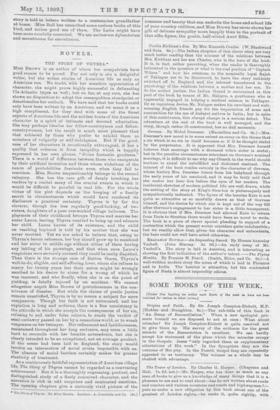Gervase. By Mabel Dearmer. (Macmillan and Co. Gs.)—Mrs. Dearmer's new
novel is to some extent an essay on the theme that a sin which is no sin in itself becomes so if it be thought sinful by the perpetrator. It is apparent that Mrs. Dearmer herself believes that marriage with a deceased wife's sister is sinful; but in the peculiar circumstances attendant on Gorvase's nominal marriage, it is difficult to see why any Church in the world should hesitate to annul the unfulfilled and dishonest contract. The interest of the book resides entirely in the character of Gervase, whose history Mrs. Dearmer traces from his babyhood through the early years of his manhood, and it may bo truly said that she makes her hero live before the eyes of her renders. The • incidental sketches of modern political life are well drawn, while the setting of the story at King's Stratton is picturesquely and sympathetically indicated. Tho figure of the heroine Kate is not quite so attractive or so carefully • drawn as that of Gervase himself, and the device by which she is kept out of the way till after Gervaso's engagement to her sister is a little transparent. It is obvious that if Mrs. Dearmer had allowed Kate to return from Paris to Stratton there would have been no novel to write. The book is a piece of clever special pleading in support of a contention which the present writer considers quite indefensible; but we readily allow that, given his character and antecedents, the hero could not well have acted otherwise.










































 Previous page
Previous page